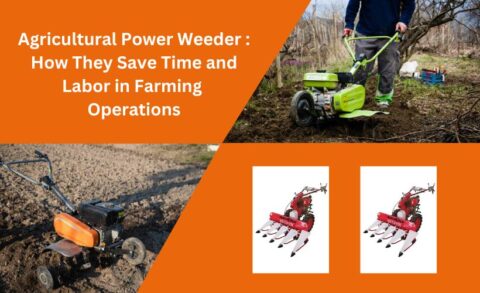Agriculture, the backbone of our food supply, is continuously evolving. With the need for increased efficiency, reduced environmental impact, and solutions to labor shortages, modern agriculture farm equipments is undergoing a technological revolution. Today’s farming tools are far from traditional; they are powered by data, automation, and precision. Here are five groundbreaking innovations in agricultural farm equipment that are transforming the industry:
1. Autonomous Tractors and Robots: The Future of Farming is Driverless
Imagine tractors operating without human intervention, working around the clock with unmatched precision. This is no longer science fiction but a reality with autonomous tractors. Equipped with GPS, sensors, and artificial intelligence, these machines can efficiently perform tasks like plowing, seeding, and spraying.
Benefits:
- Increased efficiency and productivity
- Reduced labor costs
- Improved precision and reduced waste
- Ability to operate in challenging conditions
Additionally, smaller, specialized robots are revolutionizing tasks such as weeding, harvesting, and plant monitoring. Often powered by solar energy, these robots minimize soil compaction and reduce environmental impact. These innovations also complement equipment like agricultural power weeder, ensuring effective weed control and farm maintenance.
2. Precision Agriculture: Data-Driven Farming for Optimal Yields
Precision agriculture employs data and technology to optimize farming processes. This includes:
- Variable-Rate Technology (VRT): Adjusting fertilizer, pesticide, and seed application based on real-time soil and crop health data.
- Remote Sensing and Drones: Using satellite imagery and drones to monitor crop health, detect stress areas, and assess yield potential.
- Soil Sensors: Providing real-time information on moisture, nutrient levels, and temperature to help farmers make informed irrigation and fertilization decisions.
By leveraging data, farmers can maximize yields while minimizing resource consumption and environmental impact. Additionally, agriculture spray pump price advancements are making it more accessible for farmers to implement cost-effective and efficient crop protection techniques.
3. Electric and Hybrid Farm Equipment: Sustainable Farming for a Greener Future
With a growing focus on sustainability, electric and hybrid farm equipment is becoming increasingly popular. These machines offer several advantages:
- Reduced Emissions: Zero emissions contribute to a smaller carbon footprint and cleaner air.
- Lower Operating Costs: Electric motors require less maintenance and have lower fuel costs than diesel engines.
- Quieter Operation: Reduced noise pollution improves working conditions.
From electric tractors to battery-powered sprayers, these innovations are paving the way for a more sustainable agricultural future. Additionally, agricultural irrigation water pump solutions are evolving to integrate with hybrid power sources, further enhancing energy efficiency.
4. Advanced Harvesting Equipment: Minimizing Waste and Maximizing Efficiency
Harvesting is a crucial stage in farming, and advancements in harvesting equipment are improving efficiency while reducing waste.
- Automated Harvesters: AI-powered machines can identify and harvest ripe crops with minimal damage and loss.
- Optical Sorting: Cameras and image processing technologies sort crops based on size, color, and quality, ensuring only the best produce reaches consumers.
- Gentle Handling Systems: Advanced conveyor belts and handling mechanisms reduce bruising and damage to delicate crops.
These innovations enhance efficiency and ensure that more harvested crops reach the market in optimal condition. Additionally, agriculture spray pump price solutions ensure that crops are treated efficiently post-harvest, maintaining quality.
5. Smart Irrigation Systems: Water Conservation and Efficient Resource Management
Water is a precious resource, and smart irrigation systems help farmers optimize its usage.
- Soil Moisture Sensors: These provide real-time data to ensure irrigation is only applied when needed.
- Weather Forecasting Integration: Adjusts irrigation schedules based on predicted rainfall to avoid overwatering.
- Remote Control and Monitoring: Farmers can manage irrigation systems from their smartphones or computers.
By optimizing water use, smart irrigation systems conserve water, reduce energy consumption, and improve crop yields.
Conclusion
The agricultural industry is experiencing a technological revolution, transforming traditional farming into a high-tech, data-driven field. From autonomous tractors to smart irrigation systems, these advancements are making farming more efficient, sustainable, and productive. By adopting these innovations, farmers can meet the growing demand for food while reducing their environmental impact. With continuous advancements in technology, the future of agriculture looks brighter than ever.
FAQ
Q1. What are the innovations in agriculture?
Unmanned Aerial Vehicles, or drones, are increasingly becoming useful in crop and livestock management. For example, farmers can use sensor-equipped drones to monitor the growth of plants, detect disease stress, monitor field temperature, and spray pesticides or fertilizers at desired locations on the field.
Q2. What is the biggest innovation in agriculture?
What technology has had the biggest impact on agriculture? The technology that has had the biggest impact on agriculture is arguably the development of genetically modified crops. These crops have been engineered to be more resistant to pests and diseases, tolerate extreme weather conditions, and have higher yields.










